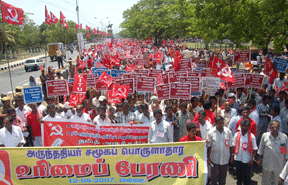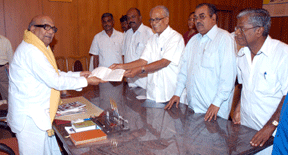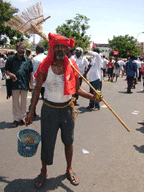 People's Democracy
People's Democracy
(Weekly
Organ of the Communist Party of India (Marxist)
No. 24
June 17, 2007
(Weekly
Organ of the Communist Party of India (Marxist)
|
Vol.
XXXI
No. 24 June 17, 2007 |
TAMILNADU
CPI(M) Demands Abolition Of Manual Scavenging
Massive Rally Held In Chennai

A view of the massive rally in Chennai
A A Nainar
THE rally held on June 12, 2007 in Chennai was a unique one in many respects. The main demand of this state level rally was to completely abolish manual scavenging of night soil, which hitherto was a demand raised feebly by various dalit organisations in different districts. It was unique in that it was the first ever dalit rally organised by any political party in the state, mobilising a particular section of dalits whose social conditions are the worst by any standard. It was also unique that the participants were more than one-half youth and more than a one-third women, which also by any standard is not common for any such rallies.
It was a rally of Arunthathiyars, Adhi Andhras and similar communities of the dalits who are specially engaged in scavenging, cobbling and handling corpses at graveyards.
The rally was organised by the CPI(M) state committee and all the state level leaders led the procession to Fort St.George, the government headquarters of the state. N Varadarajan, state secretary of the Tamilnadu state committee along with central committee members W R Varadarajan, A K Padmanabhan and U Vasuki, state secretariat members D Lakshmanan, G Ramakrishnan, P Sampath, A Soudararajan, K Balakrishnan, M N S Venkatraman, P Selvasingh and N Srinivasan and state committee members, MPs, MLAs and leaders of middle class organisations formed the vanguard of the procession and marched from Munroe statue to the state guest house area where a mammoth public meeting took place. Defying the hot sun and humid conditions, people enthusiastically sat in the public meeting and listened to the leaders with rapt attention.
GOVT LIES NAILED
When the government bureaucracy was insisting that the practice of handling night soil manually is minimal to the level where only 6000 people in the state were engaged in this horrific job, the CPI(M) conducted district level surveys and submitted its elaborate report to the government pointing out that more than one hundred thousand of them are engaged in these activities in rural panchayats, private homes in various districts, hospitals, private establishments, railways and other places. Such work is also entrusted to a particular community of dalits when large congregations during temple festivals in various holy towns use open places as mass toilets. More than 80 lakh dwellings in the state do not have a drainage connected with flush-out toilets and the manual waste is removed by men who are specifically employed for this purpose. In addition to this, even in municipalities and corporations, those employed for scavenging work have to dive into manual waste to clear blockage of underground drainages which has become a daily feature in cities like Chennai, Madurai, Coimbatore and other places. Average death toll per year of those clearing underground blockage would be at least one hundred due to asphyxiation by poisonous gases.

CPI(M) state secretary N Varadarajan submitting a memorandum to chief minister Karunanidhi
CPI(M) has been raising the demand to abolish manual scavenging for a long time and has conducted surveys at all districts to find out the real nature of this activity and the social conditions of the communities engaged in this work. While conducting these surveys, three conferences of these communities were organised in three centres. The first one was organised in Virudhunagar in September last year where more than 5000 people took part and then in April this year at Dindigul in which 6000 people participated. The third one took place at Namakkal where about 2000 people participated from one taluk of Sangagiri in Salem district. These conferences brought to the fore the crying need and urgency to put an end to manual scavenging which is an inhuman job.
WORST SOCIAL CONDITIONS
The findings of the surveys revealed that the social conditions of the Arunthathiyar communities are the worst amongst the entire dalit population. In the 198 families surveyed in the Dindigul district, not a single boy was sent to school. Since both the husband and wife were engaged in the same type of work to support the family and had to go for work early in the morning, they were not able to send their wards to school and hence most of the children were illiterates or primary school dropouts. Only about 30 per cent of the children go to high schools and most of them too get dropped out to get engaged and support their parents in scavenging work. Even if one per cent of them could finish doing a degree or diploma, they could not compete with others for jobs and are forced to come back to scavenging work.
None of them have a piece of land or own a dwelling of their own. They live in groups at the outskirts of the towns and villages in hutments. Four or five families flocking into one hutment of 150 to 200 square feet hut is most common. Since they do not have anything to pledge or mortgage, no institution gives them loans throwing them to the mercy of local usurious moneylenders. An amount of Rs 1000 borrowed for interest is never paid back but a substantial part of earnings of every month goes out as an interest towards that paltry sum.
Untouchability exists still in many forms in the state. The Arunthathiyars cannot go to temples, wear chappals, draw water from wells, take tea from roadside tea shops etc. They are practically forbidden to lead any semblance of a civilised life. Due to reservation to local bodies, a few of them got elected as chairmen of the panchayats. In most places they were forced to resign. If they donít resign, they are not allowed to function. If they do function independently, they are threatened of murder. This is what had happened in Maruthan Kinau village in Tirunelveli district, where an Arunthathiyar community president who wanted to function as a president of a panchayat was cruelly done to death.
In such a background of this serious issue, the CPI(M) took it up and had done an elaborate study and groundwork preparations for this mass mobilisation. Thousands of Arunthathiyar village meetings were conducted in almost all districts. Certain community organisations at the local level like Aathi Thamizhar Peravai, Arunthathiyar Coordination Committee, Aadhi Andhra Mahasabhai etc., were involved in this exercise and they too had participated in it very enthusiastically. The important demands were formulated in the three conferences and the leadership level meetings. In order to make the rally a big success, the party district committees had given priority to this work for the past two months. Prior to this mobilisation, the leaders of the CPI(M) N Varadarajan and T K Rengarajan went in a delegation and had submitted the demands in advance and had given time for the government to respond to the issue. They urged the chief minister of Tamilnadu M Karunanidhi to announce immediate measures to alleviate the inhuman sufferings of these communities.

IMPRESSIVE RALLY
The 25,000 strong procession on June 12, 2007 marched shouting thunderous slogans demanding an end to the human scavenging and allied activities. Earlier in the day, a ten member delegation comprising N Varadarajan, K Varadarajan, U Vasuki, P Sampath, MNS Venkatraman, P Shanmugam, Arumugam, Adhiyaman (Peravai), Jakkaiyan (coordination committee) and Nagarajan (Mahasabaha) met the chief minister and asked him to announce certain immediate relief measures to this community. Later in the day, the government had announced the formation of a welfare board for those engaged in manual scavenging work. CPI(M) leaders, P Sampath and K R Ganesh were taken as the members of the board. During the discussions, the chief minister had agreed to constitute a committee to provide intra reservations for the Arunthathiyar community soon. Earlier during the budget session of the assembly, at the insistence of the CPI(M) the government had agreed in the house to abolish manual scavenging over a period of time and had allotted an amount of Rs 84 crore for this purpose in the current financial year.
The two district committees of Chennai city had made commendable preparations for the rally. The rallyists were provided with water and refreshments. The rally inspired the participants to continue the struggle for a better future. The rallyists appreciated and thanked the CPI(M) for taking up their issues and bringing some immediate relief to them. The CPI(M) in the state would continue to raise the demands of these marginalised sections and would strive hard till the manual scavenging is abolished.